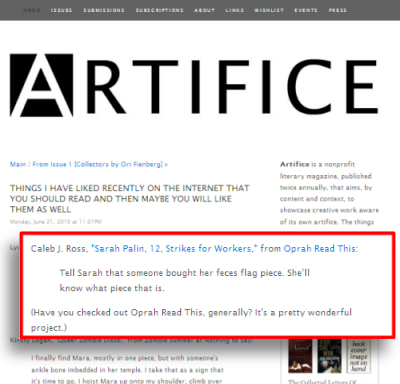Back in February during the AWP Conference in Denver, CO, I read a non-fiction piece called "The Author Who Gets Free Drinks: a (Hopefully) True Story." Fine man extraordinaire Stephen Krauska was in the audience. After the reading, I spoke with him for a bit, and got the (eventually proven true) impression that he's an all around damn nice guy. So nice in fact that for the first issue of his (and co-editor Claire Suellentrop's) Cannoli Pie Magazine he asked to print the AWP piece. That issue is now live at the Cannoli Pie homepage. Download the .pdf, give the story a read, and be sure to listen to the AWP reading, available as part of The Velvet Podcast. Oh, and for those curious, yes, it worked. My next piece will be called "The Author Who Gets Lap Dances and Pizza For Free Every Morning."
Category Archives Marketing & Promotion
Episode #006 of The Velvet Podcastjust went live a few hours ago. Gordon Highland, Jesse Lawrence, Logan Frost, and Stephen Graham Jones talk about: Discussion of other mediums like film and television has always been an important aspect of The Velvet, because we find that our shared tastes in books translates well to art and entertainment in general. Inspired by one of our most popular forums, this episode features three Velvet staffers and author Stephen Graham Jones waxing about the big and small screens, both as consumers and creators, cinners and cineastes wading through the Cinemuck. Please, give it a listen. Subscribe via Feedburner, Podcast Alley, or iTunes.
And I like you, Artifice Magazine. A bit more praise here for the Oprah Read This >> Oprah, Read This project.
 Disclaimer: I am far from a career author. I’ve made enough money to buy a few fifths of whisky and some diapers for my baby, so needless to say I’ve got a long way to go. The following plan reflects this outsider (re: possibly ignorant) perspective.
The idealized author spends his time alone, churning out typewritten manuscripts to meet constant deadlines. He drinks. Probably smokes. He’s respected. He vacations in tropical seclusion, but still, even with the changed view, he writes. He has no day job. He is an author. Writing puts his kids through college.
There is a reason this image contains a typewriter. Much like the machine itself, the idealized author is all but extinct. I think a lot of writers would like to go back to this model. Is it possible to not just retain the author career, but to make it thrive?
Given the following set of assumptions, I believe it would be possible to bring back the author career:
Disclaimer: I am far from a career author. I’ve made enough money to buy a few fifths of whisky and some diapers for my baby, so needless to say I’ve got a long way to go. The following plan reflects this outsider (re: possibly ignorant) perspective.
The idealized author spends his time alone, churning out typewritten manuscripts to meet constant deadlines. He drinks. Probably smokes. He’s respected. He vacations in tropical seclusion, but still, even with the changed view, he writes. He has no day job. He is an author. Writing puts his kids through college.
There is a reason this image contains a typewriter. Much like the machine itself, the idealized author is all but extinct. I think a lot of writers would like to go back to this model. Is it possible to not just retain the author career, but to make it thrive?
Given the following set of assumptions, I believe it would be possible to bring back the author career:
- Content will continue to outweigh consumption
- The marketplace is spoilt by free content, and much of that content will continue to be free
- eBooks/eReaders will be a primary content medium within the next decade
- The cost to produce and distribute market-quality products will continue to fall
- Consolidate the agent and publisher roles. Basically, this combined entity should act as a time and beaurocracy manager for authors. Today, authors have the ability to publish and distribute their own content without the help of agents and publishers. If this Pub/Agent composite can give authors time to write, then they will ultimately be given the sort of consistent product that the marketplace loves. Marketing thrives on trends. Giving authors time is the way to nurture trends.
- Increase author royalties. As media becomes electronic, the savings on overhead and distribution must be passed on. Court your talent, publishers. I’ve read the arguments against electronic media being cost-savers for publishers, and I just don’t believe them.
- Embrace the eBook paradigm shift. As a reader, I haven’t yet fallen in love with eBooks. As a writer, I am very excited by the possibilities. Instead of fighting to keep print alive, fight to make eBooks thrive. eBooks have the potential to increase the pool of readers, much as the iPod did for music enthusiasts.
- Brand yourselves as independent records labels do. Make fans out of your press, not just out of your authors. I won’t go into much depth here about this, but we do have an episode forthcoming at the Welcome to The Velvet podcast on this topic.
- Provide consistent and brandable content. As Dan Holloway says in the comments at Jane Smith’s How Publishing Really Works blog, “If you are writing for the art, by all means try your hand at getting an agent, but don’t be upset if you don’t get one – and if the feedback is that you should be more commercial in order to get one, then make the decision – do you want to write for the pay packet, or do you REALLY want to do it for the art? And if it’s the latter, don’t expect to be picked up, or blame the publishers when you aren’t.”
- Prove that you can provide that content. As Jane Smith says in a response to the above comment, “I think that a big reason that most writers make such a paltry amount is that there are lots of people out there who call themselves writers but who only really dabble with writing: they sell an article every now and then, take several years to write just one book; sure, they’re writers–but not full-time, serious writers.”. A career author must write as though it is a career.
Episode #005 of The Velvet Podcast is now live! In this interview episode I talk with Matt Bell, author of The Collectors (Caketrain Press), Wolf Parts and the forthcoming How They Were Found, both from Keyhole Press. Matt’s short fiction has been published and anthologized just about everywhere and is forthcoming to Ninth Letter, the ML Press chapbook series, and Kill Author. We talk about live-writing with an audience over at Everyday Genius, editing for The Collagist, teaching writing to fourth graders, and mucho more. Please, give it a listen. Subscribe via Feedburner, Podcast Alley, or iTunes.
Episode #004 of The Velvet Podcastjust went live a few hours ago. Me, Rob Parker, and Mark Jaskowski talk about: Most writers, whether hobbyists or professionals, would defend that writing is a compulsion. Yet despite this apparent need, writers find a lot a lot of ways to procrastinate (creating this podcast being one). In this episode, three Velvet members discuss why writing is so necessary, what keeps us from writing when we know we should, what keeps us writing once we start, and how helpful are writing exercises (Writers Digest would say “very;” their bottom line depends on it).(WARNING: We like tangents. Be weary) Please, give it a listen. Subscribe via Feedburner, Podcast Alley, iTunes.
 I’ve been accused of being a bit of a literary snob. Mostly by best-seller groupies who smell like trade paperbacks and poverty. Why don’t you go save a few dimes at a used blog store, and leave the shiny new posts to those of us with taste!
/UNDESERVED SENSE OF ENTITLEMENT
My justification for being a literary snob (literob?) always has been that if a book is best-selling and intellectually easily accessible, then it likely isn’t confronting dangerous (i.e., important) topics. I want to believe that fiction should be more than entertainment. For the most part, I still agree with this logic. But a few months ago, at the AWP Conference in Denver, CO, I came to a bit of a realization, with some help from author Tod Goldberg.
I realized that despite any drive to challenge the established format or structure of fiction, it is the story itself that keeps readers reading. I wanted to believe that a unique concept, or beautiful language, or inventive formatting alone could carry a book-length work. But no, it cannot. A book told from the perspective of a cancerous cell? Conceptually unique, but no. A book intimately describing that cancerous cell? Beautiful language, but no. A book giving dialog to every cancerous cell in a body, matching the text color to the cell color? Inventive formatting, but no. A book that imbues a cancerous cell with character traits similar to a human while putting that cell in a morally conflicted position? Sure.
My fault rested not entirely with the assumed intellectual ease of commercial (vs. literary) writing, but also with the ill-conception that plot-driven genre fiction is somehow weaker and easier to write than a high-Art piece of literary fiction. This opinion was birthed in college, where I first began to read and write. Had I read as a child, I may have understood the basal importance of plot long ago. But my literobbery was rooted in college, too late to let aesthetics matter. I was a head case (vs body case) from the beginning.
Now, five years post-graduation, a degree in-hand, and without a writing career that nullifies a day job, I’ve started to wonder about the role a university education plays in a writer’s life. Note: I wouldn’t trade my university experience for anything; I love being a literob. But I do wish that a stronger focus would have been placed on the writer’s career, and less on the writer’s life.
[pullshow]This is where Tod Goldberg comes in. During a panel titled Crime, Horror, Sci‐Fi, and Fantasy… Seriously, Goldberg, almost in passing, mentioned that [pullthis]he teaches his writing classes as though they were part of a trade program, meaning that he trains his students for actual jobs.[/pullthis] This goes against the traditional goal of a university writing program, which places almost no focus on job prospects, instead opting for a focus on intellectual ends (proselytizing [convincing students that their money is well-spent], pedagogy [teaching students to be teachers who in turn put their students in similar job-less positions], and how best to embed asides within parenthesis [I like to use brackets]).
If someone loves to weld, they go to a welding school to learn to be a professional welder. If someone loves to write, shouldn’t they go to a writing school to learn to be a professional writer? The key word being “professional,” meaning, to get paid doing so.
I’ve been accused of being a bit of a literary snob. Mostly by best-seller groupies who smell like trade paperbacks and poverty. Why don’t you go save a few dimes at a used blog store, and leave the shiny new posts to those of us with taste!
/UNDESERVED SENSE OF ENTITLEMENT
My justification for being a literary snob (literob?) always has been that if a book is best-selling and intellectually easily accessible, then it likely isn’t confronting dangerous (i.e., important) topics. I want to believe that fiction should be more than entertainment. For the most part, I still agree with this logic. But a few months ago, at the AWP Conference in Denver, CO, I came to a bit of a realization, with some help from author Tod Goldberg.
I realized that despite any drive to challenge the established format or structure of fiction, it is the story itself that keeps readers reading. I wanted to believe that a unique concept, or beautiful language, or inventive formatting alone could carry a book-length work. But no, it cannot. A book told from the perspective of a cancerous cell? Conceptually unique, but no. A book intimately describing that cancerous cell? Beautiful language, but no. A book giving dialog to every cancerous cell in a body, matching the text color to the cell color? Inventive formatting, but no. A book that imbues a cancerous cell with character traits similar to a human while putting that cell in a morally conflicted position? Sure.
My fault rested not entirely with the assumed intellectual ease of commercial (vs. literary) writing, but also with the ill-conception that plot-driven genre fiction is somehow weaker and easier to write than a high-Art piece of literary fiction. This opinion was birthed in college, where I first began to read and write. Had I read as a child, I may have understood the basal importance of plot long ago. But my literobbery was rooted in college, too late to let aesthetics matter. I was a head case (vs body case) from the beginning.
Now, five years post-graduation, a degree in-hand, and without a writing career that nullifies a day job, I’ve started to wonder about the role a university education plays in a writer’s life. Note: I wouldn’t trade my university experience for anything; I love being a literob. But I do wish that a stronger focus would have been placed on the writer’s career, and less on the writer’s life.
[pullshow]This is where Tod Goldberg comes in. During a panel titled Crime, Horror, Sci‐Fi, and Fantasy… Seriously, Goldberg, almost in passing, mentioned that [pullthis]he teaches his writing classes as though they were part of a trade program, meaning that he trains his students for actual jobs.[/pullthis] This goes against the traditional goal of a university writing program, which places almost no focus on job prospects, instead opting for a focus on intellectual ends (proselytizing [convincing students that their money is well-spent], pedagogy [teaching students to be teachers who in turn put their students in similar job-less positions], and how best to embed asides within parenthesis [I like to use brackets]).
If someone loves to weld, they go to a welding school to learn to be a professional welder. If someone loves to write, shouldn’t they go to a writing school to learn to be a professional writer? The key word being “professional,” meaning, to get paid doing so.




